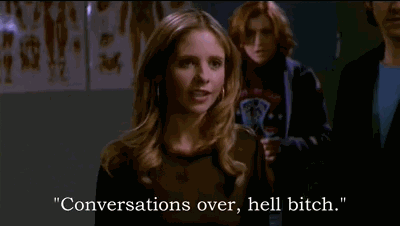If you watched a horror movie prior to the 1990s you were likely going to be faced with a beautiful, perky, blonde white woman who was going to have the worst time ever, and end up with a whole lot of PTSD, if she survived at all. From the Hitchcock Blonde of the 1950s and 1960s to the busty cheerleader of the 1970s and 1980s, the archetype was everywhere, and she always ended badly. And then, in the 1990s, the narrative that we thought we all knew, that we were so familiar with, was turned on its head, and we were introduced to something completely different. She was still blonde, and perky, and a cheerleader, but she also kicked so much supernatural ass that she became a cultural icon in her own right.
When Joss Whedon created Buffy the Vampire Slayer his intention was to allow that silly, blonde cheerleader to take back the power that had been taken from her over decades of horror movies. He created a character who was small and athletic, not stupid but not the sharpest tool in the shed, brave, heroic, and not a little arrogant. She was also destined and fated to be "...a chosen one. She alone will wield the strength and skill to fight the vampires, demons, and the forces of darkness; to stop the spread of their evil and the swell of their number. She is the Slayer". Essentially, over the course of seven seasons (I don't count the movie, just the show) the character of Buffy Summers would go on a journey equal to that of any tragic hero, including Odysseus, and do it while navigating high school, dating, parental conflict, as well as the larger cultural issues of the day. But through all of it, through every fight, and every death, and all the Big Bads that cropped up year after year, Buffy kept fighting the good fight, because that was the right thing to do. Even when her chosen-ness became a little less solo, after she died (the first time) and another Slayer rose up, she kept going. She could have devolved into the shallow woman she was before she rose, but she didn't. She defied the expectations fo what it meant to be a woman that looked like her, from the background that created her. She could have become a rich man's wife, like many a southern California blonde. She chose to be something else instead.
That's not to say that the show didn't have its problematic moments, And there is no avoiding the fact that Joss Whedon turned out to be a trash-fire of a human being who's "feminism" only extends as far as attractive young white women over whom he holds some modicum of power. This kind of behavior from powerful men in Hollywood is all too common and brings up completely different discussions about how to deal with tainted favorites. That being said, for a time, Buffy Summers presented a strong role model who never lost her ability to drop a witty pun while beating the ass of beings that were larger and meaner and older. And she did it all while looking fabulous and defying ancient prophecies. If Buffy can do all that, you should never let anyone tell you that you can't have it all.
When Joss Whedon created Buffy the Vampire Slayer his intention was to allow that silly, blonde cheerleader to take back the power that had been taken from her over decades of horror movies. He created a character who was small and athletic, not stupid but not the sharpest tool in the shed, brave, heroic, and not a little arrogant. She was also destined and fated to be "...a chosen one. She alone will wield the strength and skill to fight the vampires, demons, and the forces of darkness; to stop the spread of their evil and the swell of their number. She is the Slayer". Essentially, over the course of seven seasons (I don't count the movie, just the show) the character of Buffy Summers would go on a journey equal to that of any tragic hero, including Odysseus, and do it while navigating high school, dating, parental conflict, as well as the larger cultural issues of the day. But through all of it, through every fight, and every death, and all the Big Bads that cropped up year after year, Buffy kept fighting the good fight, because that was the right thing to do. Even when her chosen-ness became a little less solo, after she died (the first time) and another Slayer rose up, she kept going. She could have devolved into the shallow woman she was before she rose, but she didn't. She defied the expectations fo what it meant to be a woman that looked like her, from the background that created her. She could have become a rich man's wife, like many a southern California blonde. She chose to be something else instead.
That's not to say that the show didn't have its problematic moments, And there is no avoiding the fact that Joss Whedon turned out to be a trash-fire of a human being who's "feminism" only extends as far as attractive young white women over whom he holds some modicum of power. This kind of behavior from powerful men in Hollywood is all too common and brings up completely different discussions about how to deal with tainted favorites. That being said, for a time, Buffy Summers presented a strong role model who never lost her ability to drop a witty pun while beating the ass of beings that were larger and meaner and older. And she did it all while looking fabulous and defying ancient prophecies. If Buffy can do all that, you should never let anyone tell you that you can't have it all.




Comments
Post a Comment